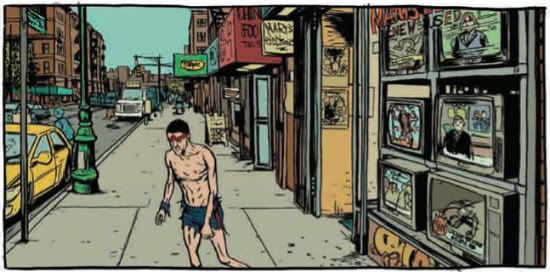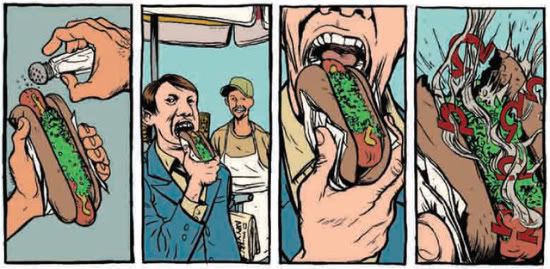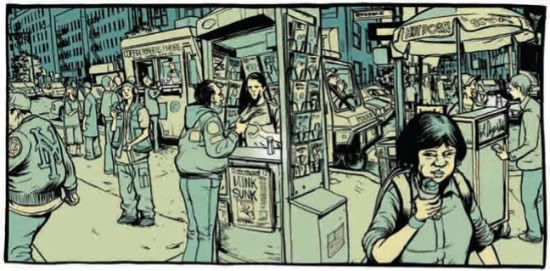Jog seems much more himself on 7/17: Yes. Quite.
/![]() Omega: The Unknown #10 (of 10)
Omega: The Unknown #10 (of 10)
This is as good a superhero comic as any I've read this year. It's an EXCELLENT ending to a VERY GOOD series, throwing all of its might behind Farel Dalrymple's drawings and Paul Hornschemeier's colors, with a few callbacks to the (still-uncredited) guest art of Gary Panter. There's exactly eight words of dialogue in this whole issue, but every story beat is clear as a bell. Each page seems dipped in some distilled essence of all the melancholy, eccentricity and droll humor dealt heretofore by writer Jonathan Lethem ("with" Karl Rusnak, as always); little is concluded (yep, it's one of those endings, True Believer), but all is evoked, climactically.
Still, I'd strongly recommend you read the whole series again, front-to-back. That was my own first impulse upon finishing this issue, and it proved to be more rewarding than a reread typically is. Simply put, I was impressed with how straightforward the story really is, when taken all together. Mysteries may build upon mysteries in the serial format, but there's some very keen A-to-B plotting at work here -- and often nuanced plotting -- that I don't think registers quite so well unless the whole thing is right in front of you. It's certainly not oddness for its own sake - hell, it's even got one of those bits where a character helpfully explains the work's theme while talking about something else (that'd be Alex's speech to the class at the top of issue #3).
Or, let me put it this way - I've seen a fascinating reading of the series as a metaphor for Asperger's Syndrome. I'd never picked up on that aspect while following the series monthly. But then, going through the work again, right there in issue #3 we've got a doctor suggesting that the young protagonist might, in fact, have Asperger's Syndrome ("Not that I'd want to make a snap diagnosis based merely on affect."). In the new Comic Foundry (No. 3, Summer 2008), there's an interview with Lethem in which he goes into how the idea of 'franchising' got to him, and how his teenaged reading of the original Steve Gerber/Mary Skrenes/Jim Mooney series left him with the impression that it was "scarred" and "impure" from Marvel U concessions, driving it away from the ideal of issue #1 - the same issue #1 that this new series all but remade for its own debut issue, "A version of an unfinished dream" by its original creators.
And sure enough, there's this very consistent narrative throughline about franchises - not just the obvious stuff, the corporate hot dog stuff, but superhero franchises, dehumanization and the notion of 'individuality' in a universe more prone to creating fungi.
Allow me to ruin the comic for you.

Truth be told, a surface reading of the series' themes doesn't benefit it much. Oh dear, individuality (Alex and his band of rebels and oddballs) vs. hideous conformity (the Mink's branding, the nanobots' army of slaves) in a superhero milieu - how banal can you get? Marvel has typically sought access to atypical audiences through hybridization -- melding superheroes to whatever other genre seems interesting or fitting -- and this project may prove to be a success with the bookstore-leaning 'literary' comics audience, in that Mighty Marvel Manner. I wonder what they'll take from their reading - jokes about crummy fast food and cultural homogenization hardly seem genius grant stuff.
I expect they'll be more receptive to Lethem's interplay between the homeliness of Omega's urban neighborhoods & grassy campuses and the various eruptions of superhero fury and camp. Dalrymple & Hornschemeier were always the perfect visual team for such content, the former's lines matching scratchy streets/faces with disarmingly lithe action scenes, craggy faces growling in bendy containers until their robot bodies pop into splinters or their fleshy forms singe to the bone, their remains returned to the scrap of the city and the cut of the grass. Hornschemeier, meanwhile, casts nearly all the outdoors in earthy tones, as if to reinforce how natural humans can seem among buildings as much as hills. At home, where Lethem (with Rusnak) can have them speak frankly. Even a born performer like the Mink has unusual candor, in the way Stan Lee always plays Stan Lee.
Me, I find the work's themes simply fascinating from their accumulated context. Lethem may be one of many, many successful prose writers taking a crack at the funnies these days, but he's also unique in that he's stated, quite directly, that he doesn't want to nurture any alternate career; he has no follow-up comic planned, no sequel intended. This is 'his comic' -- one written in evident homage to a comic he read as a younger man -- and that's perfectly enough. Likewise, all of the artists involved surely have retained some lingering reader's connection to the superhero genre -- Panter's admiration of Jack Kirby is obvious, and I do believe Hornschmeier may have been a child of the Image revolution, if the bedroom pinups from The Three Paradoxes were adequately autobiographical -- but none of them have actually worked on a big-time superhero comic, until now.
As such, it's not hard to see this Omega revamp as a genre summary, particularly as it deals in so many typical superhero concerns. In that aforementioned Comics Foundry interview (conducted by Andrew Avery, for the record), Lethem notes that he always took the Gerber/Skrenes/Mooney Omega as sort of a Superman parody - accordingly, his Mink is a 'bad' version of Batman, one I see as totally melting Bruce Wayne into his superhero persona by combining Bat-labels with Wayne Enterprises for big profits. Both of them are also grittier 'Marvel' versions, with the Mink tucking city politicians into his pocket and Omega drifting from job to job in total alienation, an adult invader with no kindly couple to raise him right.

As the series moves forward, we learn some of the history of the Omegas - the Mink only understands them in terms of franchising, and they indeed are essentially a Green Lantern Corps. of space police dedicated to defeating a singular robot threat. But just as the robots operate by transforming people into zombies through nanotech-infested fast food and cool toys -- there's an awesome bit in this issue where a superhero called the Hurler gets an action figure of himself, which then sticks to his hand so he can't hurl it away (oh the commentary!) -- the Omegas are, in the interests of cosmic balance, individual to a fault.
The first Omega assigned to Earth, bearded Sil Renfrew, found himself totally vulnerable to the aimless rebellion common to terrestrial young folk. He wound up a tool of the Mink's, a Boy Wonder in a crazy adult's fantasy of superhero power, then dead from real-life warfare. The nameless adult Omega of the story finds it impossible to relate to anything in the world, refusing to so much as eat anything he doesn't cook himself (also a good precaution, given the nature of his foes!). And Alex, the young future Omega, chafes under the demands of his born task while also failing to grasp much of a world he was raised apart from, so as not to repeat the mistakes of Sil.
Knowing all this, and knowing the ultimate plan of the Omegas to counteract the nanobot menace with subtle additives to the food supply, a broad vision of superhero comics reveals itself, tethered to Lethem's view of the original Omega as tainted - as if by imperceptible robots! This new series might start the same way as the old one, but it exists as Lethem's ideal, and maybe holds within it the conflict that marked his initial reading. After all, this does take place in the (or 'a') Marvel Universe, threatened by subversion and homogenization - invaders making the story into stupid shit! They're all corporate interests, and -- by Lethem's own estimation of the old Omega -- Marvel's interests.
Really! The Mink stands as an old, storied superhero property (I loved how what we see of his own comics are a horrible, totally queasy wedding of ham-fisted adult themes and nonstop licensing opportunities), happy with his bureaucracy and long-ago gone amoral. The beauty of Lethem's characterization (with Rusnak) is that he's still a damned funny, charismatic presence, the most purely entertaining character in the series - you can completely see how he got so popular, even if he's gone real shitty. But in the end, the robots create a terrible spinoff of the main property, and neither survive the conflict that follows.
Only the Omegas and their few human friends stand as forces for vitality -- individual voices! -- in this harsh superhero landscape. Heroes like Steve Gerber, beaten down; the greatest irony of this story is that they're all poised as classic hard-luck Marvel heroes, flawed people and monsters each, hated and feared and misunderstood by the people and genre they've come to protect. This seriously may be the most self-depreciating thing Marvel has ever published, as perhaps could only come from an acclaimed outsider given carte blanche to act on his old superhero feelings - who says autobiography is all boring?
That's not to say that everything Lethem happens upon is entirely fresh -- one of the dangers of this sort of book is that the necessarily detached writer might happen upon smashing insights that more immersed genre specialists figured out years ago -- but even such Genre Interrogation 101 moments as the main characters encountering a whimsical 'silly' magic character the Mink has hidden away in a labyrinth are bolstered by the story's powerful focus on character - it's not that Alex and company need to free the Nowhere Man, but that the encounter frees Alex to reconcile the delicacy of human friendships he'll never fully understand with his human/inhuman nature as a Marvel Superhero.

And so, with this issue, we reach the end. It's hardly a song and a dance, though it pulses with formal assurance. Omega (the unknown) blows the robots to bits, and is left with no tangible foes - lost as Sil Renfrew, before the robots arrived, yet still sickly aware of his purpose. Every panel in which Dalrymple draws Omega writhing against Panter's backgrounds (Gary Panter, as: the soul of superhero comics) is like a kick to the face; it's agony.
Meanwhile, the battle against the unseen aspects of the invasion goes totally underground - if you squint, you can see the heroic salt shining white against the pale world above, as the infestation slowly continues. Alex rejects all labels, throwing away his Omega costume and the book of Omega secrets. The last we see of him, he's holed up alone, rebuilding his robot parents, seemingly resigned to never having any real friends - he'll just build some. Everyone drifts apart - some seem hopeful, but there's such melancholy. No more costumes; no more adventures.
The greatest ambiguity though, is saved for the book's final pages, in which a ruined, alcoholic Omega descends into the underworld to sit in a jury-rigged approximation of the Mink's old television show, taped together with garbage and broadcast to nobody outside of direct eyeshot. The last superheroes we see.
Is that Lethem's estimation of the genre? Barely holding itself together, playing for a tiny audience, populated by weird doppelgängers of once-handsome corporate properties. Honestly, I pick up a hint of... defiance to it. A transformation of the mainstream into something bizarre and personal-in-its-way. Off-putting, but joyful. Everyone in the crowd seems truly happy.
Not the unknown, though - not on the stage. Surely he'd like his time to be done. And while he'll have to live forever, so long as his Marvel Universe endures, the limited confines of this project grants him a personal mercy, a bottle transmission of our reader's eye out of his world and back into our own. Never to return, until the next time.











